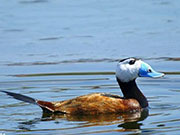Saving a rare duck

 0 Comment(s)
0 Comment(s) Print
Print E-mail CNTV, October 8, 2016
E-mail CNTV, October 8, 2016
Urbanization often pits development against the environment. And in Xinjiang, one of the victims is the white-headed duck. The duck is one of the rarest birds in the world. Bird-Life International, the world's largest nature conservation partnership, estimated in 2008 that the duck's world population was only somewhere between 8,000 to 13,000. A small group of these ducks have been found at a small lake, just ten kilometers from the regional capital Urumqi.
In today's episode, reporter Han Bin meets a group of conservation volunteers. Their struggle with local developers and ordinary people, will decide the fate of this endangered species in China.
Hidden among the densely populated urban areas, is a small patch of wetland. The lake is home to some one hundred species of birds. At least one of them is under threat.
"The white-headed duck is on the world's list of endangered species. It's not been registered in China, so cannot be protected by law. It's also a star species, as it's the prototype of Disney's Donald Duck," Yan Xi, volunteer from Wild Xinjiang, said.
"How can we have such a fine-looking species? -with a white head, blue bill, and stiff tail," Da Xiang, volunteer from Wild Xinjiang, said.
This habitat provides the ducks with the resources to reproduce. But someone else wants their home. Construction is rapidly eroding the wetland.
There have been so many vehicles, people who go to the lake for outings, or even to play with slingshots.
Yan Xi and Da Xiang belong to a group of local volunteers who have appointed themselves the ducks' protectors. Their short-term goal is to have all 24 ducks make it to migration season at the end of October.
The challenge is enormous.
"On summer weekends, so many people come to swim or have barbecues. In spring,
many people come to steal the eggs. We have confiscated 43 eggs during our inspections. Only 3 were able to hatch, because most embryos stop growing at low temperatures. Sometimes, when we stop the egg thieves, they throw the eggs into the lake or reeds. And we can't report it to authorities because they've destroyed the evidence," Yan said.
It's a race against time, as more and more buildings go up.
"On the east shore, we found this little duck dying in water that had been polluted with oil. I took it home for dissection, and found that its organs were all filled with oil. That's what killed it. I preserved it as a specimen," Yan said.
"This little duck was from the smallest of the 8 eggs we confiscated. But it was the first to pip. We named it Hope. We hoped that all eggs could hatch; we hoped all ducks could go back to nature, we hoped they could come here to breed every year. But when it was found dead, we were so sad and some cried. We felt as though all hope was gone," Yan said.
China's rapid pace of urbanization has reached remote/isolated areas in its far western Xinjiang. It's taken its toll on this unique habitat, sending much of the wildlife to the brink of extinction. Many say urbanization should not come at the cost of the ecology. Much needs to be done to control the process.
"We hope the government can work together with us, in building this lake into
a park and wetland reserve. Although we can't stop the pace of urbanization, we need to protect the remaining wetlands," Yan said.
"I hope our children can see them. But not to build a monument for the ducks, saying they once lived here before," Da said.
"The development of this city is closing in on the lake. Many large birds have left. If we do not disturb them, or destroy and pollute their environment, all living creatures can be integrated into nature. We can observe and live with them. It's really a great life. What we are doing is not to protect a particular species, but to protect the entire eco-system. If the eco-system is damaged, all kinds of species will die sooner or later," Da said.
Yan Xi fears humans have lost their love for nature. And he wants to turn this around. For the ducks, for the lake for the future.





